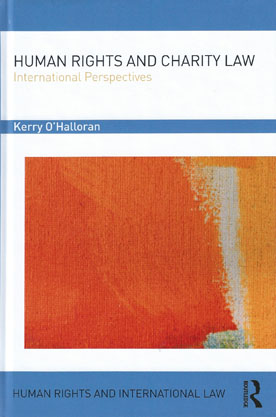
The 60 or so nations that subscribe to the common law tradition had for centuries broadly accepted the same legal definitions of what constitutes a charity.
In recent years, however, a number of countries have embarked on charity law reform processes, designed to strengthen the regulatory framework and to review and encode common law concepts. A primary driver of reform was the need to modernise national charity law and ensure human rights compatibility.
In light of these reforms this book takes stock of how charity law is adapting to face the challenges presented by human rights.
The book identifies the key areas where human rights and charity law intersect and examines the importance of those areas, the principles involved and their political significance. It offers a comparative analysis of selected common law countries including England, Wales, Ireland, U.S., Canada, Australia and New Zealand assessing the extent of national human rights and charity compatibility.
Kerry O’Halloran also goes on to consider tensions arising from the intersection of human rights and charity law including the significance of cultural values and heritage, the importance of proportionality and striking a balance between public and private interests in current society.